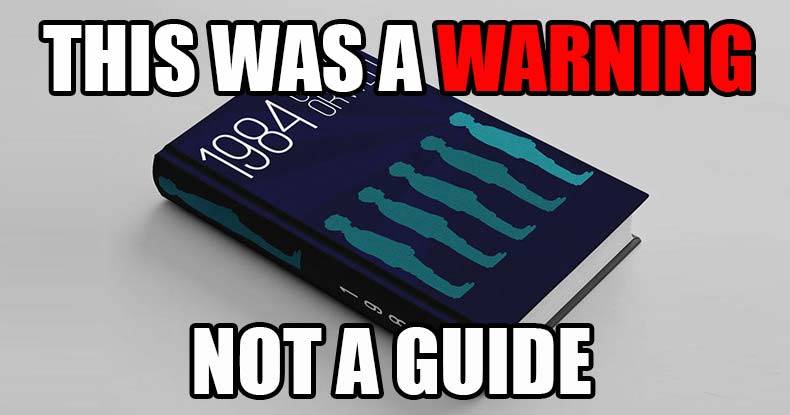It’s the Anniversary of the Book that Changed the World — 3 Ways 1984 has Become Reality
by Claire Bernish, The Free Thought Project:

Assessing current conditions in the United States, it would be next to impossible not to grasp innumerable parallels to George Orwell’s dystopic portent, 1984. Though other fictional dystopias could similarly elicit comparisons to the dark turn taken by American empire, aspects of 1984’s creepy authoritarian nightmare ring all-too-true.
And Big Brother-like surveillance — though undoubtedly relevant — imparts only the most obvious, and therefore least pertinent, connection on the list.
WAR IS PEACE
“Oceania was at war with Eastasia: Oceania had always been at war with Eastasia,” Orwell wrote of two of the three remaining nation-states on the planet. Though it analogizes Russia’s mercurial relationship with Nazi Germany, the same volatility aptly fits U.S. involvement in the Middle East — where, though propaganda would purport a decisive enemy, the truth remains far murkier. A constant state of undeclared but active war rules foreign policy — driven almost exclusively by the war machine’s profiteering from plundering of foreign lands’ natural resources.
Big Oil, Big Pharma, and the multi-faceted defense industry have experienced exponential profits since perpetual war became the de facto basis of foreign policy — and Big Banks share in the reward. But all of this war requires the U.S. government maintain support from the public — and what better way to win them over than appeal to fear of the Other?
When John Brady Kiesling, a career diplomat, tendered his letter of resignation to Secretary of State Colin Powell, he piercingly criticized the warped factors driving both American domestic and foreign policy surrounding the needless war in Iraq — with barbs unfortunately equally applicable today:
“We spread disproportionate terror and confusion in the public mind, arbitrarily linking the unrelated problems of terrorism and Iraq. The result, and perhaps the motive, is to justify a vast misallocation of shrinking public wealth to the military and to weaken the safeguards that protect American citizens from the heavy hand of government. September 11 did not do as much damage to the fabric of American society as we seem determined to [do] to ourselves […]
“Has ‘oderint dum metuant’ [Let them hate so long as they fear] really become our motto?”
After the attacks of September 11, 2001, it became immediately evident American government had its jackpot ticket for war in perpetuity — the only necessary condition being wool sufficiently ambiguous to cover the public’s eyes in fear.
Since that time, under the guise of national security, Big Brother-like domestic surveillance has become so thoroughly entrenched in our lives as to be virtually ignored by the general populace. As a necessary and insidious outgrowth of massive spying, the government attempts to cultivate fearful citizen-spies, by employing the not-at-all ominous If You See Something, Say Something catchphrase-titled program. Of course, the government arm responsible for this and other programs — the overarching Department of Homeland Security — seems ripped directly from the pages of 1984.
“Political language is designed to make lies sound truthful and murder respectable, and to give an appearance of solidity to pure wind,” Orwell noted in his 1946 essay, “Politics and the English Language.” This observation aptly summarizes U.S. war propaganda in its entirety — with a constant government-backed corporate media blitz surrounding the war on terror shaping public perception of what constitutes terrorism, and who, a terrorist.
Betting on Americans’ cognitive dissonance, historical amnesia, and tacit acceptance of spoon-fed, baseless patriotism, the government doesn’t often find barriers to inculcating a blanket support for obtuse military missions. War so saturates every aspect of life, when the Pentagon announced last week forces had already been on the ground in Yemen for two weeks, the public instead trained its focus to the latest installation of Captain America.
And nevermind the detail that ground support of Saudi Arabia and the United Arab Emirates in Yemen would be allocated for fighting al-Qaeda — a different faction of the same group the U.S. currently employs as somehow less dangerous terrorists to assist deposing Syrian president Bashar al-Assad. Moderate rebels is thus the Newspeak term for terrorists the American empire finds usable — making terrorist and terrorism utterly conditional terms. Of course, the government failed to explain how a war on the concept of terrorism should play out if that terrorism depends on circumstance — or, more accurately, whim — but once instituted, paranoia surrounding the word opened the floodgates for battling terrorism inside the United States.
Exactly as Orwell cautioned in 1984 — and precisely as Kiesling’s foreboding resignation letter predicted it would.
FREEDOM IS SLAVERY
How does a government persuade its citizens their enslavement would be desirable and beneficial? Frame it as necessary protection against any threat to their fundamental security — and implement more contentious aspects of said servitude in palatable microsteps. Fear of terrorism — or, more directly, xenophobia — constitutes sufficient reason for many to cast off basic human rights through increasingly invasive laws and governance.
Legislation, however, isn’t by far the sole vehicle available to the government. In a culture so utterly imbued in paranoia, neighbors aren’t only willing to spy on neighbors — or complete strangers, to that end — they’re willing to alert law enforcement should they observe … Something.
One perfect example of the absurdity of the If You See Something, Say Something citizen spy program occurred this week when a woman, suspicious of cryptic notes penned by the person seated next to her on an American Airlines flight, decided to Say Something.
The flight was delayed for over two hours, the FBI was called, and an egregious commentary on paranoia and xenophobic profiling in the U.S. became one of an unfortunate many for the history books.
Read More @ TheFreeThoughtProject.com
Loading...



